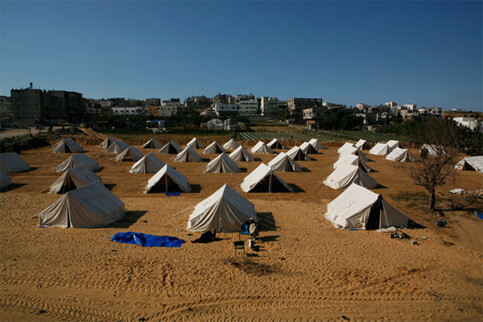Gaza Strip 3 February 2009

Tents for those whose homes were destroyed in Israel’s 22-day-long military siege of Gaza, 31 January 2009. (Matthew Cassel)
Piles of bricks, metal sheets and pieces of wood, are all that remains of tens of Palestinian homes in the Ezbet Abed Rabu (Abed Rabu Ranch) neighborhood, east of Jabaliya town in the northern Gaza Strip.
“There is nothing left for us to live for — the house was lost and the furniture destroyed,” lamented Suad Muhammad Abed Rabu, a 53-year-old mother sitting in front of a fire stove in a still intact room of her badly damaged home. “We prefer to die in our demolished house rather than live life as outcasts,” she said. “Since we were born we have been suffering. Since 1948 we have moved from one refuge to another and from one war to another. All, including Arabs and Europeans, are conspiring against us, they don’t want us to live.”
Abed Rabu’s home used to shelter 14 family members. Although it is almost completely destroyed, the family chose to remain in it rather than live in the tents international aid agencies have recently erected in the battered neighborhood.
Neighborhood children play amidst the rubble of destroyed homes while their parents huddle in the tents or stand in lines to receive blankets and other items in the newly-installed small refugee camp.
“I am here to receive blankets,” said Muhammad Saleh Abed Rabu, one of the people in line, who explained that his home was severely damaged and all his furniture destroyed. “Israeli bulldozers attacked the home, where I lived with 27 other people.”
In the same neighborhood 13 homes belonging to the Siyam family were leveled to ground by Israeli bulldozers and explosives on the first day of the Israeli ground attack on the Gaza Strip.
“Before they destroyed the homes, there was intensive shelling so we fled the area. Even while we were leaving, some people were hit, some died and others were wounded. Just few days ago we returned to our area to find only rubble,” Tayseer Siyam recalled while standing on the rubble of his two-story house. “I wonder why this area was attacked when resistance fighters were based in the open fields not right here among us.”
Thousands of homes in various parts of the Gaza Strip were destroyed during the three-week-long Israeli attack on the territory, which began on 27 December under the pretext of stopping rocket fire from Gaza into nearby Israeli towns.
The widespread destruction of residents’ homes in Gaza reminds many of the Palestinian people’s plight of 1948, when Israel displaced hundreds of thousands of Palestinians from hundreds of towns and villages all over Palestine, turning them into refugees.
According to local estimates, the financial losses in the Gaza Strip are estimated at $2.4 billion while the region needs at least a two-year-long reconstruction process that is yet to begin.
International aid agencies emphasize how much remains to be done to assist people in Gaza to recover from the trauma and devastation caused by the Israeli attack.
Adnan Abu Hasna, a spokesman for the UN agency for Palestine refugees (UNRWA) in Gaza said, “The situation is more than miserable. We have provided the displaced people with blankets, food items and other things, but this is not enough.” He called on the international community to pressure Israel to reopen the borders so badly needed aid could flow and reconstruction could begin.
Donor countries including some member states of the European Union and the United Nations are expected to meet in Egypt in the spring to discuss Gaza reconstruction.
Rami Almeghari is contributor to The Electronic Intifada, IMEMC.org and Free Speech Radio News and is a part-time lecturer on media and political translation at the Islamic University of Gaza. Rami is also a former senior English translator at and editor-in-chief of the international press center of the Gaza-based Palestinian Information Service. He can be contacted at rami_almeghari A T hotmail D O T com.
Related Links





